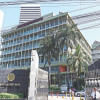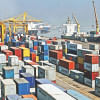Achieving $110b export target by FY27 is difficult

The government's target of earning $110 billion from exports by the fiscal year of 2026-27 would be difficult to attain because of the persisting challenges in the global and local economies, economists and businesspeople said.
Over the last two decades, Bangladesh's shipment has grown by 10.25 percent annually on average. This means if the country wants to pull off the goal by FY27, the export growth has to be accelerated.
The government has fixed the new target in its Export Policy for 2024-27.
Exporters and economists, however, expressed doubts about whether the goal can be hit since consumers globally have long been feeling the pinch of an elevated level of inflation caused by the global supply chain disruptions amid the dragging fallout of the Covid-19 and the Russia-Ukraine war.
The higher consumer prices have badly affected people's income and spending.
Bangladesh exported goods worth $55.55 billion in the last fiscal year of 2022-23 and services worth $7.50 billion, with their combined growth rate standing at 3.42 percent, according to data from the Export Promotion Bureau (EPB).
"If the government wants to reach the target, the growth rate will have to much higher than the current pace. However, this will be difficult given the global and local economic outlooks," said MA Razzaque, research director of the Policy Research Institute (PRI).
The economist also pointed out the lack of product diversification.
Bangladesh is heavily reliant on garments for export earnings. The sector accounts for about 85 percent of receipts from sales in overseas markets.
"The restricted import policy will also affect the export," Razzaque said.
The depreciation of the local currency against the US dollar might help exporters gain competitiveness to some extent. The taka has lost its value by about 35 percent in the past two years.
When the currency of an economy weakens, exports receive a boost and become more competitive in the global market.
"Still, it is not enough to achieve the targeted export by the stipulated time," Razzaque said.
Mohammad Hatem, executive president of the Bangladesh Knitwear Manufacturers and Exporters Association, said the export may stand at a maximum of $80 billion by FY27 because there are a lot of challenges that are affecting the export sector.
He cited the crises of gas and power and the challenges in the banking sector.
The Export Policy offers a financial package as an alternative to the direct cash subsidy on export receipts.
The government is phasing out direct subsidies since Bangladesh can't keep providing aid in the current forms once it becomes a developing nation in 2026 as per World Trade Organisation rules.
As part of the financial package, the government has proposed forming an Export Development Fund with the EPB. Exporters may get loans in the form of venture capital at a lower interest rate and on easy terms.
The government will also provide consultancy and technical assistance for product development and diversification of exportable goods.
Assistance for warehousing and setting up sales centres abroad, skills development for marketing in international markets, and low-cost bank loans to set up green energy units and effluent treatment plants have been proposed.
The government will also provide 5 to 10 percent rebates on electricity, water and gas bills, fix a reasonable cost for their use by industrial units, and examine if the same can be provided for the use of diesel and furnace oil.
Besides, exporters will enjoy waivers on licencing fees and exemptions on all duties on imports of capital machinery and spare parts.
Incentives of 2 percent to 2.5 percent on the export receipts will be extended to the service sector, the policy said. A 2 percent cash incentive has been proposed for local shipping companies carrying export-oriented goods.

 For all latest news, follow The Daily Star's Google News channel.
For all latest news, follow The Daily Star's Google News channel. 








Comments